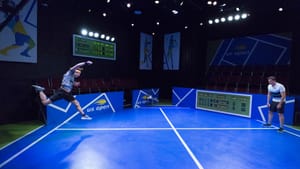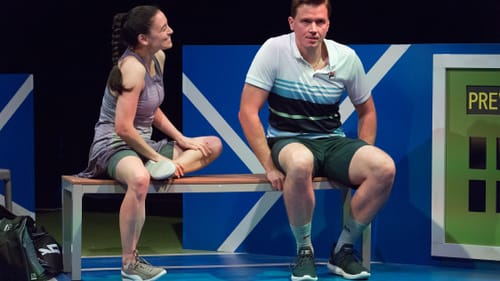Stay in the Loop
BSR publishes on a weekly schedule, with an email newsletter every Wednesday and Thursday morning. There’s no paywall, and subscribing is always free.
The next point
Lantern Theater Company presents Anna Ziegler’s ‘The Last Match’

Former Australian tennis champion Rod Laver said that when playing tennis, “The next point—that’s all you must think about.” But notice the word “must” here: it’s not that the point is all you do think about, but rather all you should. Because in any sport—or indeed, in pretty much any endeavor—things on the periphery find their way in. And that’s how we wind up at Anna Ziegler’s The Last Match.
Set during the semifinals of the US Open, the play does not focus on the match, but rather makes it a framing device for the players’ internal monologues—past matches remembered, past conversations replayed. And while it doesn’t hurt if you understand the game of tennis, it’s these moments that ultimately make the play so compelling.
Ancient at 34
Though one of the play’s earliest laughs comes when we hear how “old” 34-year-old Tim Porter (Scott Miller) is, the truth is he’s an elder statesman of the sport. With six US Open wins under his belt, Tim is rumored to be pondering retirement…especially if he can be once again victorious.
The only thing between Tim and the final round is Russian player Sergei Sergeyev (Matteo Scammell), 10 years younger than his opponent and enjoying the fruits of a meteoric rise in the international tennis rankings. Sergei is hot-headed, full of swagger, and secretly in awe of the man across the net from him. To fans of the sport, this pairing is not unrealistic. It seems there’s always a young player facing off against an idolized older player, the match a combination of aggression and admiration.
Off the court
A play about tennis in which you just watch the actors pantomime playing tennis—no rackets or balls appear on the stage—would get boring quickly, which is why from the very beginning of the play, we hear directly from both Tim and Sergei. There is no fourth wall to be broken here—the playing space is surrounded by the audience on all sides—but its metaphorical destruction establishes up front that we are not really in the audience to see a play about tennis, but rather a play about tennis players.
We first meet Tim’s wife, Mallory (Joanna Liao), and Sergei’s fiancé, Galina (Lee Minora) in flashbacks. The action of the match is suspended to help the audience understand all the weight the players carry with them onto the court. We learn Mallory, a former tennis pro herself, is in the stands with the couple’s infant son (a content warning: miscarriage and infertility are explored in surprising detail in The Last Match, so if you are currently struggling with these issues, keep this in mind before you book tickets). We learn that Galina’s relationship with Sergei is tempestuous but nevertheless adoring, and that she has made great sacrifices in her life, both in pursuit of her acting career and for the sake of her relationship with Sergei.

The interactions between the couples are largely set in the past, near and distant, and they help to establish just how impossible it is for Tim and Sergei—or how impossible it would be for any player—to push everything aside and just focus on the next point.
More than a tournament
You don’t have to know a thing about tennis to find The Last Match compelling. That being said, if you don’t know a thing about tennis, the frequent return of focus on the scoreboard throughout the play could be distracting. If you can arrive to the play early, be sure to read dramaturg Meghan Winch’s notes on tennis scoring and tournament structure to help preempt some of your potential confusion when the action of the play returns to the real-time tournament.
Far from marooning us in the match, Miller and Scammell embody their athletic characters, and the moments of play are well-staged by director M. Craig Getting in the center of the St. Stephen’s black-box theater, with set designed by Lance Kniskern to evoke the mood, if not the actual shape, of the USTA National Tennis Center. Though neither Liao nor Minora get any court time, their physicality is also impressive, with Liao convincingly playing pregnant without any prosthetics or padding and Minora’s slow-motion Russian enthusiasm-cum-anger playing legibly across her face as she watches the match. Because at the end of the day, what makes The Last Match so compelling, and so relatable, isn’t the tale of the tournament, but rather the real live humans who play the game.
What, When, Where
The Last Match. By Anna Ziegler. Through December 15, 2019, at St. Stephen’s Theater, 923 Ludlow St., Philadelphia. (215) 829-0395 or lanterntheater.org.
St. Stephen’s Theater is accessible only by stairs.
Sign up for our newsletter
All of the week's new articles, all in one place. Sign up for the free weekly BSR newsletters, and don't miss a conversation.

 Jillian Ashley Blair Ivey
Jillian Ashley Blair Ivey